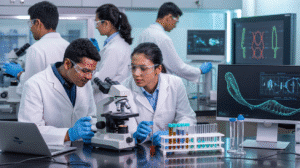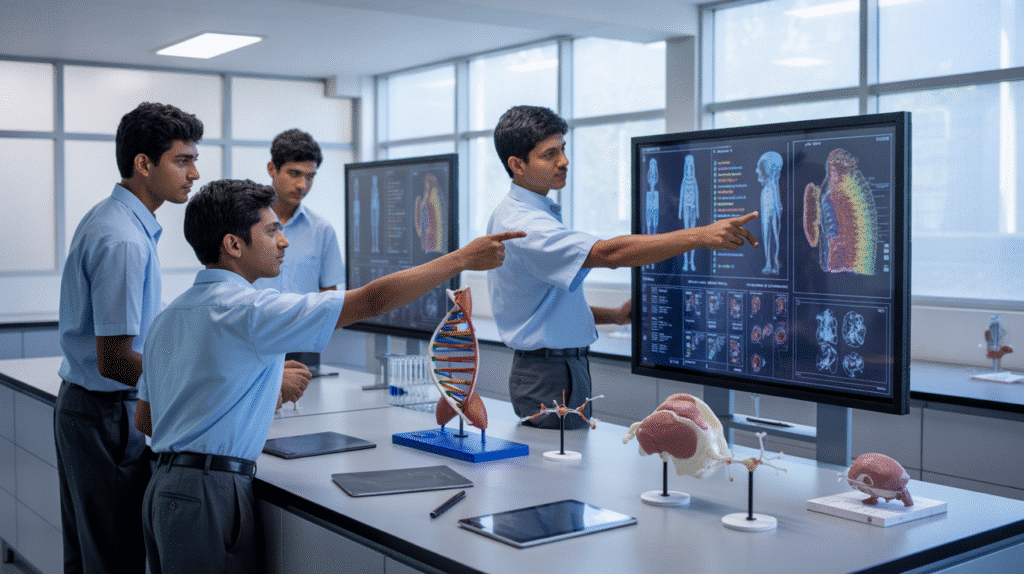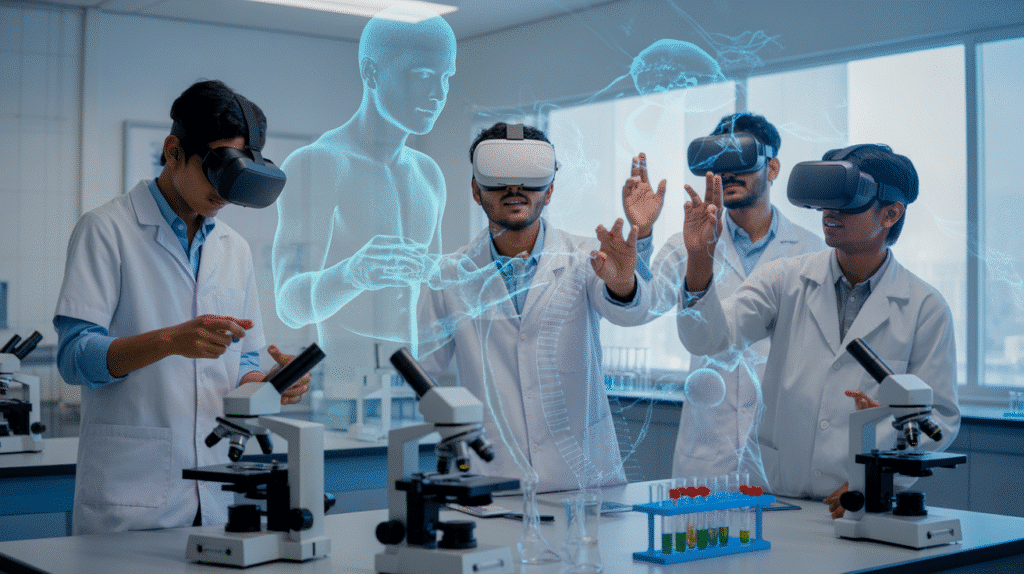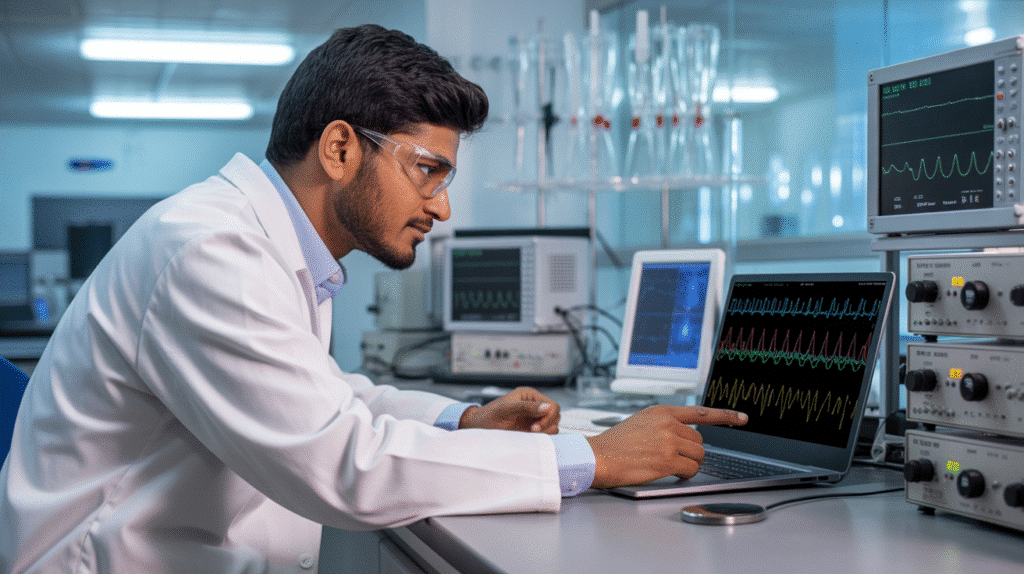
Trending Biomedical Projects Ideas for College Students
Why Biomedical Projects Are Your Gateway to Healthcare’s Future
Biomedical Engineering stands at the exhilarating intersection of engineering principles and medical sciences, dedicated to solving complex problems in healthcare. This rapidly expanding field is of growing importance in modern healthcare innovation, driven by the global need for more effective, accessible, and personalized patient care. It’s the discipline responsible for turning groundbreaking scientific discoveries into life-enhancing tools and therapies.
Biomedical Projects are the hands-on expression of this synergy. These projects bridge the gap between abstract technology and critical medical science, leading to the creation of tangible solutions that directly improve human health. From developing precise biosensors for real-time body monitoring to designing intricate prosthetics and leveraging AI-driven medical tools for early diagnosis, biomedical projects are the innovation engines of the industry. Key areas include the miniaturization of diagnostic equipment, the rise of ubiquitous wearable devices, and the creation of intelligent therapeutic systems.
Student interest in Biomedical Projects is soaring, recognizing their profound academic and research value. They offer a unique opportunity to apply engineering skills to meaningful, real-world problems. For engineering students and future medical innovators, working on a final-year biomedical project is essential.
To support this ambitious endeavor, ClickMyProject has emerged as a trusted provider. We offer a comprehensive catalog of innovative, ready-to-use, and customizable Biomedical Project Ideas for Students, all backed by expert technical guidance. We aim to empower the next generation of biomedical engineers to make a tangible impact on global health.
Understanding the Scope of Biomedical Engineering
Biomedical engineering is a vast, multidisciplinary field that masterfully integrates electronics, biology, and data analytics. It operates on the principle that engineering methodologies can be applied to biological systems to enhance medical practices and outcomes. This integration allows engineers to work on everything from the cellular level to the design of complex hospital systems.
The applications of biomedical systems span across three critical areas: diagnostics, monitoring, and rehabilitation. In diagnostics, engineers design highly sensitive tools to detect diseases early, such as systems for precise ECG signal analysis to identify cardiac anomalies. For monitoring, devices are created to continuously track a patient’s condition, like advanced systems for real-time oxygen level monitoring and wearable AI-based patient tracking that alert clinicians to subtle changes in health status. Rehabilitation involves designing therapeutic devices and assistive technologies to restore function.
Undertaking rigorous biomedical engineering research projects is vital, as they directly contribute to the latest innovations in healthcare technologies. These projects push the boundaries of current technology, leading to new methodologies in non-invasive sensing, advanced imaging techniques, and personalized medicine approaches. By engaging in these biomedical projects, students not only learn theory but contribute to the innovation pipeline, preparing them for highly specialized roles in research and development.

Importance of Biomedical Projects for Students
For both engineering and medical students, working on biomedical projects is arguably one of the most critical experiences in their academic journey. These projects are vital because they force students to synthesize knowledge from distinct domains: electronics for sensor interface, coding for data processing, physiology for understanding biological signals, and instrumentation for device construction. This holistic, interdisciplinary approach is essential for skill-building.
Creating Biomedical project ideas for students translates classroom theories into practical competence. For example, a student designing a basic vital signs monitor gains invaluable hands-on experience in signal conditioning, microcontroller programming, and patient safety protocols. These biomedical projects significantly enhance employability by providing a portfolio that showcases problem-solving skills applied to real-world medical challenges, making graduates highly attractive to medical device companies and research institutions.
Even engaging with Biomedical mini projects for final year students—like building a simple digital thermometer or pulse monitor—provides foundational knowledge in circuitry and data acquisition. This practical exposure demystifies complex medical technologies and prepares students to face the strict regulatory and ethical demands of the healthcare sector, fostering a sense of responsibility alongside technical expertise.
Latest Trends and Innovations in Biomedical Projects
The pace of innovation in biomedical engineering is staggering, fueled by converging digital technologies. Modern biomedical projects are centered around several trending technologies: wearable medical devices, which offer continuous, non-intrusive monitoring; IoT healthcare solutions, enabling seamless data transmission to the cloud; and sophisticated biosignal processing techniques that extract meaningful health insights from raw physiological data.
The integration of AI, machine learning, and cloud computing is redefining modern biomedical systems. AI algorithms are used for pattern recognition in large datasets, leading to faster and more accurate diagnostics. Machine learning powers projects like smart prosthetic arms that learn muscle signals for precise control, while cloud computing facilitates remote patient monitoring systems that allow doctors to track patient health data from anywhere. Mobile health apps are utilizing these technologies to deliver personalized wellness advice and disease management tools.
To ensure students are prepared for the jobs of tomorrow, Latest Biomedical project topics 2025 focus heavily on these themes. Examples include developing next-generation remote health tracking platforms using IoT sensors or creating advanced machine learning models for predicting neurological disorders. ClickMyProject is committed to innovation, continuously updating its project database to match these current trends and provide students with the most relevant and forward-thinking topics.

Top Biomedical Project Ideas for Final Year Students
Selecting a final year project is a critical decision. These Biomedical project ideas for students are categorized to help you choose a domain that aligns with your career goals and interests.
A. Sensor-Based Biomedical Projects
These foundational biomedical projects focus on data acquisition and instrumentation.
- ECG and Heartbeat Monitoring System: A low-cost project to acquire, filter, and display the electrocardiogram (ECG) signal in real-time.
- Temperature and Oxygen Level Detection System: A compact device using pulse oximetry and digital temperature sensors to measure two vital signs simultaneously and flag abnormal readings.
- Blood Pressure and Pulse Rate Monitoring System: Developing a non-invasive device that records and averages blood pressure readings, displaying results on an LCD or mobile interface.
B. IoT-Enabled Biomedical Projects
These Biomedical project ideas for students focus on connectivity, cloud integration, and remote access.
- Remote Patient Monitoring System via Cloud: An IoT system that collects patient vital signs (from multiple sensors) and securely transmits them to a cloud server, allowing a doctor to view the data on a web dashboard.
- IoT-based Smart Wheelchair for Disabled Patients: Enhancing a conventional wheelchair with IoT connectivity, GPS tracking, and voice command features for improved autonomy and emergency alerting.
- Health Tracking Wearable Device using IoT Sensors: Designing a custom wearable prototype (perhaps for stress or activity monitoring) that utilizes Bluetooth and Wi-Fi to send data to a personal mobile application.
C. Artificial Intelligence in Biomedical Projects
These Biomedical project ideas for students involve machine learning models for predictive and classification tasks.
- AI-based Disease Prediction Model: Developing a machine learning classifier (e.g., using Python/TensorFlow) trained on clinical datasets to predict the risk of a common condition like heart disease or stroke based on patient inputs.
- Machine Learning for ECG Signal Classification: An advanced project to classify ECG signals into normal and various common arrhythmia categories using deep learning techniques like Convolutional Neural Networks (CNNs).
- AI-Powered Diabetes Detection System: Creating an AI model that analyzes non-traditional input data (like lifestyle logs or retinal images) to aid in the early detection and management of diabetes.
D. Biomedical Device Projects for Engineering
These are focused on device design, mechanics, and control systems.
- Smart Glove for Paralysis Patients: A device using flex sensors and actuators (or motors) to assist in hand grasping and releasing actions for patients with partial hand paralysis.
- Prosthetic Limb Controlled by EMG Sensors: A major Biomedical device projects for engineering students involving the use of Electromyography (EMG) sensors to detect muscle contraction signals to control the movement of a motorized prosthetic hand or arm.
- Automated Drug Dispensing Machine: Designing a controlled system that precisely dispenses medication doses at scheduled times, ideal for hospital or elderly care settings, with a mobile reminder interface.
E. Research-Oriented Biomedical Projects
These Biomedical project ideas for students focus on advanced signal processing and novelty.
- Brain Signal Processing for Mind-Controlled Applications: Utilizing Electroencephalography (EEG) signals and feature extraction techniques to control a simple external device (like a robot arm or cursor).
- Biomedical Image Enhancement using MATLAB: Developing algorithms in MATLAB to improve the clarity, contrast, or remove noise from medical images (e.g., X-rays or CT scans) to assist in diagnosis.
- Smart Medical Alert System using AI Algorithms: Designing a system that analyzes multiple inputs (vitals, movement) to intelligently determine and predict the likelihood of a medical emergency and notify caregivers instantly.
Step-by-Step Guide to Choosing the Right Biomedical Project
Choosing your final-year biomedical project requires careful strategy to ensure it meets both academic rigor and personal interest.
- Identify your Interest Area: Start by determining your core passion within the field. Do you lean towards hardware and device design (e.g., prosthetics)? Software and connectivity (e.g., IoT)? Or complex analysis (AI and biosignal processing)? This helps narrow your focus from the vast options available.
- Evaluate Project Feasibility and Available Resources: Be realistic. Assess the complexity of the project versus your available time, budget, and skill level. Complex projects may require specialized sensors or powerful computing resources.
- Choose Topics based on Innovation and Technical Depth: Select a project that is novel or significantly improves upon an existing solution. For academic excellence, the topic must demonstrate technical depth—proving your proficiency in complex algorithms or intricate system integration. Topics suitable for biomedical engineering research projects often involve machine learning or signal processing.
- Align with Academic Requirements: Ensure the project fulfills all criteria set by your department (e.g., hardware components required, software documentation standards, scope for future work).
- Seek Expert Mentorship: This is crucial. A mentor can guide you past technical roadblocks and help refine your scope.
ClickMyProject is uniquely positioned to assist. Our experts provide mentorship to help students select the best topic, ensuring it is both innovative and fully achievable within their academic timeline.

Tools and Technologies Used in Biomedical Projects
Core Software Platforms for Biomedical Projects
The software stack determines the analytical capability and intelligence of Biomedical projects.
- MATLAB: This remains the industry and academic standard for Biomedical projects involving advanced signal processing, algorithm development, and data visualization. Students rely on MATLAB’s specialized toolboxes (like the Signal Processing or Image Processing toolboxes) for tasks such as cleaning raw ECG data or enhancing medical images.
- Python: Python is indispensable for modern Biomedical projects, particularly those leveraging Artificial Intelligence. Its vast ecosystem of libraries—including NumPy and Pandas for data handling, Matplotlib for plotting, and specialized tools like scikit-learn or TensorFlow for Machine Learning—makes it the preferred language for creating predictive models and intelligent diagnostic systems in Biomedical projects.
IoT Frameworks in Biomedical Projects
Connectivity and remote access are fundamental to contemporary Biomedical projects. IoT Frameworks facilitate the secure transmission and storage of patient data.
- IoT Platforms (e.g., Firebase, AWS IoT, ThingSpeak): These services are used in IoT-based Biomedical projects to securely receive data streamed from hardwarestore it in a cloud database, and provide real-time web dashboards for visualization. These frameworks are key to developing a fully functional Remote Patient Monitoring System as a Biomedical project.
Designing Functional Biomedical Projects
Students can combine these tools to design highly functional Biomedical projects:
- A student might use to interface with a basic heartbeat sensor, code the logic in C++ (IDE), and then use a Python script running on a to pull the data.
- The Python script then applies a Machine Learning algorithm (trained using TensorFlow) to classify the heartbeat.
- Finally, the classified data is pushed to a cloud-based IoT Framework so that a doctor can monitor the patient’s status remotely.
This synergistic use of different technologies ensures that the resulting Biomedical projects are not only academically sound but also functionally robust and aligned with industry standards for connected healthcare solutions.
Benefits of Doing Biomedical Projects with ClickMyProject
ClickMyProject is the trusted partner for students pursuing ambitious biomedical projects, offering a comprehensive support system that ensures successful completion and superior academic performance.
- Access to a Vast Repository of IEEE-Based Biomedical Projects: Our projects are often inspired by peer-reviewed research, ensuring academic credibility and high-quality technical implementation.
- End-to-End Guidance: We offer comprehensive support from the initial stage of topic selection through code explanation, ensuring you understand the technology, all the way to preparing for the final presentation.
- Real-Time Project Demos and Expert Technical Support: Students receive working video demos and continuous technical support, minimizing debugging time and maximizing learning.
- Support for Diverse Project Types: Whether you require simple Biomedical mini projects for final year for foundational skill-building or complex, research-level implementations for thesis work, we have tailored solutions.
- Availability of Documentation, Code Files, and Working Video Tutorials: Every project is delivered with complete source code, detailed technical reports, and video guides, making project submission and presentation seamless.
- Focus on Market Relevance: Many of our offerings, including Biomedical device projects for engineering, are designed with industry application in mind, providing students with experience directly transferable to careers in medical technology development.
Future Scope of Biomedical Engineering Projects
The future of healthcare is inextricably linked to biomedical engineering projects. Globally, there is immense demand for engineers who can develop smart, scalable, and affordable medical technology.
The future of biomedical innovation will be characterized by extreme personalization, non-invasive monitoring, and data-driven intelligence. This translates into massive career opportunities for students who complete relevant projects, including roles in top hospitals (as clinical engineers), R&D in research labs, and agile med-tech startups. Growth is particularly robust in wearable tech, biosensor innovation (e.g., microfluidics and implantable sensors), and AI healthcare (e.g., robotics and diagnostic imaging).
ClickMyProject stays ahead of the curve, continuously updating its repository to align with these emerging biomedical advancements. By offering updated project kits every year, we ensure that students are working on relevant, cutting-edge technology, equipping them for the most competitive roles in the future global health landscape.
FAQs
1. What are the best Biomedical Projects for final year students?
The best Biomedical Projects include IoT-based patient monitoring systems, advanced biomedical sensors, and AI-powered diagnosis tools that enhance healthcare efficiency and demonstrate strong integration skills.
2. Why should students choose Biomedical Projects for their engineering course?
Students should choose Biomedical Projects because they combine medical knowledge with technology, helping them gain hands-on experience in solving real-world healthcare problems, which is highly valued by recruiters.
3. Does ClickMyProject provide Biomedical Mini Projects for beginners?
Yes, ClickMyProject offers beginner-friendly Biomedical mini projects for final year students, complete with guidance, source code, and working video demos for easy learning and quick completion.
4. Can I get customized Biomedical Project Ideas from ClickMyProject?
Absolutely! ClickMyProject provides personalized Biomedical Project Ideas, helping students select topics that align with their unique academic goals and current skill levels.
5. Are the Latest Biomedical Project Topics for 2025 available at ClickMyProject?
Yes, ClickMyProject updates its biomedical project collection every year, ensuring access to the latest biomedical project topics 2025 with full documentation support to keep students on the cutting edge of technology.
Conclusion
Biomedical Projects are the transformative force driving healthcare innovation and elevating engineering education simultaneously. By tackling challenges in diagnostics, monitoring, and therapy, such projects empower students to develop vital analytical, technical, and creative thinking skills.
These projects are more than just assignments; they are your entry point into a rewarding career focused on improving lives. ClickMyProject is the most trusted platform for students seeking innovative and ready-made Biomedical Projects, complete with expert support, full documentation, and quality-assured source code.
Don’t just complete an academic requirement create a solution that matters. Explore the vast catalog of Biomedical Project Ideas for Students on ClickMyProject today and turn your academic learning into a tangible, real-world impact.


